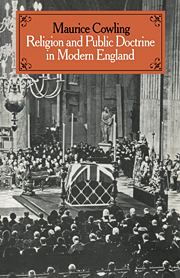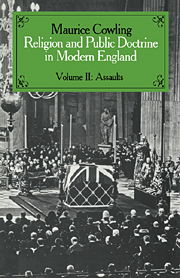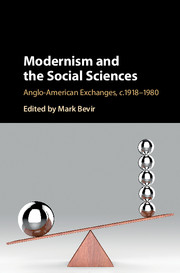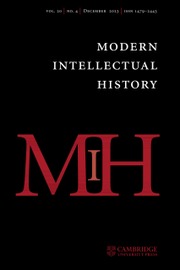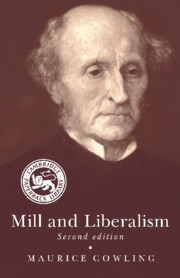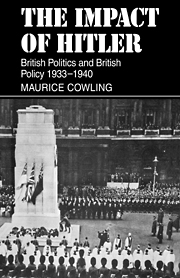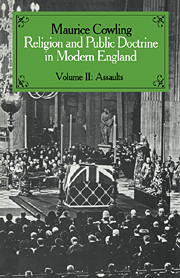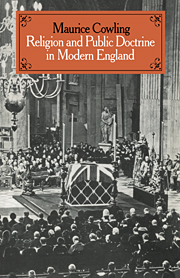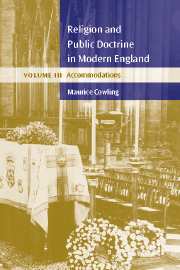
Religion and Public Doctrine in Modern England
Volume 3. Accommodations
£135.00
Part of Cambridge Studies in the History and Theory of Politics
- Author: Maurice Cowling, Peterhouse, Cambridge
- Date Published: August 2001
- availability: Available
- format: Hardback
- isbn: 9780521259606
£
135.00
Hardback
Other available formats:
Paperback, eBook
Looking for an inspection copy?
This title is not currently available on inspection
-
The third and concluding volume of Maurice Cowling's magisterial sequence examines three related strands of English thought - latitudinarianism, the Christian thought which has assumed that latitudinarianism gives away too much, and the post-Christian thought which has assumed that Christianity is irrelevant or anachronistic. As in previous volumes, Maurice Cowling conducts his argument through a series of encounters with individual thinkers, including Burke, Disraeli, the Arnolds, Tennyson and Tawney in the first half, and Darwin, Keynes, Orwell, Leavis and Berlin in the second. Central to the whole is Mr Cowling's contention that the modern mind cannot escape from religion. Religion and Public Doctrine in Modern England represents a massive contribution to the intellectual and cultural history of modern England, of interest to historians, literary and cultural critics, theologians, philosophers, economists, as well as to that broader reading public with a serious interest in the making of the English mental landscape.
Read more- The culmination of an intellectual project central to the cultural history of modern Britain
- Probably the last major statement by one of the most distinguished British historians of the post-war period
- Enormous contemporary resonance, given the Blairite reassertion of doctrinal politics, and reactions to that
Reviews & endorsements
' … this concluding offering is of such sophistication and subtlety of thought …'. Professor Edward Norman, Church Times
See more reviews' … this will be recognised as a very important book.' Professor Edward Norman, Church Times
'This book, like the two volumes that preceded it, is a masterpiece of invective and erudition. No one can pretend to understand the intellectual background to our times without reading it.' Country Life
'Reading it provides a very remarkable experience.' Catholic Herald
'Religion and Public Doctrine in Modern England is a remarkable book, quite sui generis…This dense yet witty work is worth whole shelves of the cultural studies that are coming to supersede the real work of history.' Government and Opposition
'It is a magnificent achievement and Catholic schools will want this volume in the school library even if they do nto have the previous two.' Mentor Magazine
'… the trilogy will be compulsory, and perhaps even compulsive, reading for anyone interested in the place occupied by Christianity as a 'public doctrine' in England over the last century and a half.' Journal of Ecclesiastical History
Customer reviews
Not yet reviewed
Be the first to review
Review was not posted due to profanity
×Product details
- Date Published: August 2001
- format: Hardback
- isbn: 9780521259606
- length: 792 pages
- dimensions: 225 x 151 x 44 mm
- weight: 1.025kg
- availability: Available
Table of Contents
Introduction
Part V. The Christian Intellect and Modern Thought in Modern England:
1. The reanimation of protestantism I: Carlyle, Froude and Kingsley
2. Christianity and literature I: Burke and Disraeli
3. The reanimation of protestantism II: Thomas Arnold, Bunsen, Jowett, Stanley, Lyall and Max Muller
4. The enlargement of Christianity: Matthew Arnold, Seeley, Sidgwick and Wicksteed
5. Christianity and literature II: Dickens, Tennyson, Browning, Pater and Wilde
6. Christianity and modern knowledge I: Stirling, Wallace, Caird and Green
7. Whiggism, liberalism and Christianity I: Macaulay, Lecky, Bryce and Fisher
8. Whiggism, liberalism and Christianity II: Fitzjames Stephen, Acton, Maine, Inge, Henson and Smuts
9. Christianity and modern knowledge II: Whewell, Stubbs and Cunningham
10. Christianity in an unfriendly world I: Shaftesbury, Maurice, Westcott, Tawney and Temple
11. Christianity in an unfriendly world II: Forsyth, Masterman, Gore, Figgis and Lewis
12. Christianity in an unfriendly world III: Underhill, Eddington, Needham, Zaehner and Jung
13. Christianity in an unfriendly world IV: Balfour, Ashley and Joseph Chamberlain
14. Christianity in an unfriendly world V: Milbank and Macintyre
Part VI. The Post-Christian Consensus:
15. Modern knowledge and the post-Christian consensus I: Darwin, Dawkins, Galton and Pearson
16. Modern knowledge and the post-Christian consensus II: Freud, J. B. S. Haldane, Huxley and Popper
17. Modern knowledge and the post-Christian consensus III: F. H. Bradley, Bosanquet, R. B. Haldane, A. C. Bradley, Elgar, Parry and Hadow
18. Modern knowledge and the post-Christian consensus IV: Maitland, Hobhouse, Keynes and Hayek
19. English socialism as English religion: The Webbs, Macdonald, Laski, Orwell and Crossman
20. Literature and the post-Christian consensus: Wordsworth, Hardy, Kipling and Forster
21. Modern knowledge and the post-Christian consensus V: Richards and Leavis
22. Modern knowledge and the post-Christian consensus VI: Williams, Eagleton, Kenny, Skinner and Scruton
23. Judaism and the post-Christian consensus: Namier, Berlin, Koestler and Steiner
24. Complication and dilapidation
Conclusion: the author and the argument
Index.
Sorry, this resource is locked
Please register or sign in to request access. If you are having problems accessing these resources please email [email protected]
Register Sign in» Proceed
You are now leaving the Cambridge University Press website. Your eBook purchase and download will be completed by our partner www.ebooks.com. Please see the permission section of the www.ebooks.com catalogue page for details of the print & copy limits on our eBooks.
Continue ×Are you sure you want to delete your account?
This cannot be undone.
Thank you for your feedback which will help us improve our service.
If you requested a response, we will make sure to get back to you shortly.
×
